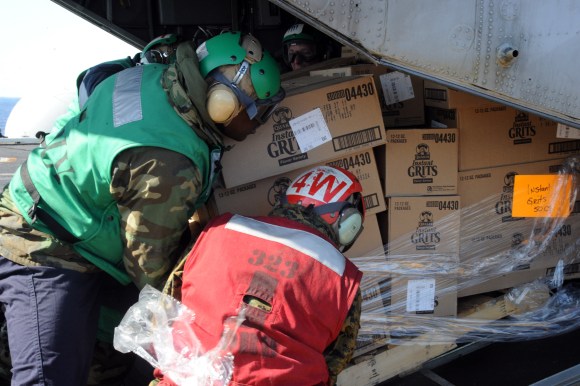
Although it has been more than two and a half years since the devastating earthquake and tsunami struck northeastern Japan, much of the area is still in need of disaster aid for the recovery efforts. But before you look around your house for items to donate, take a look at what volunteer groups, local governments and aid recipients themselves would rather you keep at home. And you might be very surprised to what else Twitter users have deemed the most “unnecessary things at a disaster zone.”
Paper Cranes
The well-known Japanese tradition of folding 1,000 origami paper cranes to grant a wish may provide comfort in times of catastrophe, but with so many paper cranes sent to shelters, schools and local governments, Twitter users said that a lot of these gifts had to be thrown away. One person said that after running out of places to hang the birds, the rest were incinerated. It’s a nice gesture, but seriously, how many bits of origami can one region possibly need?
Dirty clothes
Another big complaint was the amount of dirty, used clothes donated to survivors who had lost everything. Some said that they even received “very obviously used” underwear and bras. Also, volunteers who sorted the many boxes that came in also asked that you leave your “ancient” and out-of-season clothing at home. There just is not enough space to store your Edo era geta apparently.
Obsolete technology
Helping out people who have just lived through a traumatic experience should not be an excuse to get rid of your 1995 laptop and accompanying floppy disks. One Japanese netizen talked about receiving a donation box in the mail, only to discover an unusable analogue TV without a remote. They also were lucky enough to get an 60 Hz alarm clock that cannot keep time in their part of Japan due to the different power grids.
Packages in foreign languages
While mostly everyone said they were thankful for all the support given from around the world, a lot of netizens shared how many aid recipients threw away some of the food, medicine and supplements in foreign packages. Without any Japanese translation and not knowing the language, a lot of people were concerned not knowing the ingredients or expiration date.
Questionable food
Again, the message seems quite clear to not use a disaster to clean out your house, and especially not your pantry. A lot of people recalled receiving dirty and dented canned goods that were past their expiration date, or handmade items like a shipment of 500 rice balls that quickly went bad.
Medicine
If you are not a doctor, you should probably refrain from sending medicine or supplements to people with medical needs in a disaster zone. A lot of the medicine was expired and one person said they received a huge amount of tranquilizers that they did not even need.
Heavy things
Time and space is precious after a disaster and sorting through donations is a huge task. Having to lug around boxes of 30-year-old diet books, autographed baseballs from not-so-famous players or elementary school backpacks is not the best use of volunteers’ time.
Plastic bags
One person said that they once got two boxes full of used plastic grocery bags. The bags were very neatly folded and clean, but utterly useless and ended up sitting in the corner before being thrown away.
24/7 News
This is not so much a physical item, but after endless hours of news covering the disaster’s aftermath, a lot of netizens said they wish the networks would “donate” something a little more entertaining. Many of the volunteers, workers and survivors felt like the self-imposed “restraint” from any form of entertainment made TV much less of a “gift” and more of a burden. Some found solace in watching recorded shows from their happier pre-3/11 world as well as movies to escape their daily sadness.
Too many volunteers
This may sound like biting the hand that feeds you, but some local governments and volunteer groups would prefer for some people to stay home and help out in more useful ways like donating blood or raising money. It seems like some volunteers would spend a great deal of money traveling to help, only to leave after a short time. This left a lot of local groups wondering if the volunteers’ time and money could have been better spent on localized disaster relief.
A lot of the people who received the less-than stellar donations ultimately thought that the thought behind the gift was heartfelt, but they just future “thoughts” could be a little lighter. One netizen put it this way, “If you don’t consult with the people you are donating to, your donation will likely become just another box taking up space.”
Are there any other tips to share about what we shouldn’t donate after a catastrophe? Hopefully with these tips and yours, we can save disaster zone workers from coming across someone’s dirty panties or that busted up tin of sardines from 1950!
Source: Togetter
Images: 1, 2, 3, 4, 5, 6, 7,